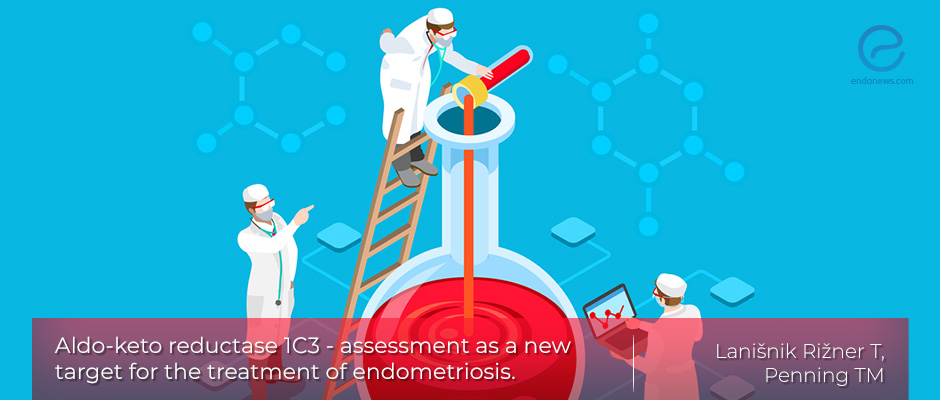A new target for the treatment of endometriosis?
Nov 14, 2019
Is BAY1128688, AKR1C3 inhibitor, one of the new options for endometriosis?
Key Points
Highlight:
- Dr. Penning group discussed the rationale of using AKR1C3 (Aldo-keto reductase 1C3) inhibitors and their effects on endometriosis.
Background:
- Inflammation in the pelvic cavity is very common in endometriosis patients and the pro-inflammatory prostaglandins (PG)[PGE2, PGF2a] increased in the peritoneal fluid.
- Targeting synthases such as nonsteroidal inflammatory drugs are expected to be promising.
- Endometriosis is considered as a disease of dysregulated progesterone action or progesterone resistance. However, drugs that stimulate the protective action of progesterone have unwanted side effects.
- New options that are more effective in reducing pain or not affecting fertility are highly required.
Key points:
- AKR1C3 inhibitor is one of the new options, with some preclinical data to support that AKR1C3 as a promising target.
- This might be explained by combined effects that involve PGF2 epimers, progesterone, testosterone, estradiol, geranyl pyrophosphate, and 9-cis-retinoic acid.
- In a marmoset model, the endometriotic lesions were reduced by an AKR1C3 inhibitor treatment and these data initiated clinical trials.
Conclusions:
- The phase II clinical trial was recently terminated due to hepatotoxicity.
- However, this may not rule out the possibility of this and other targetable options.
- Better drugs need to be developed to treat endometriosis.
Lay Summary
Endometriosis affects around 10% of women in reproductive age, estimating more than 176 million women worldwide. Inflammation in the pelvic cavity is very common in endometriosis patients. Therefore, there are high concentrations of cytokines and immune cells in the peritoneal fluids.
The concentrations of the pro-inflammatory prostaglandins (PG)E2 and PGF2a are increased in peritoneal fluid of endometriosis, compared to the healthy women. The main reason for this increase is due to the overexpression of genes that encode prostaglandin synthases in endometriotic tissue. Therefore, targeting these synthases such as nonsteroidal inflammatory drugs (NSAIDs) are expected to be promising.
Endometriosis is considered as a disease of dysregulated progesterone action or progesterone resistance. Therefore, drugs that stimulate the protective action of progesterone are currently available. However, these treatments have side effects including persistent pain and infertility. New options that are more effective in reducing pain or not affecting fertility are highly required.
AKR1C3 inhibitor is one of the new options. This molecule seems to be one such target that has roles in prostaglandin androgen and estrogen biosynthesis, progesterone metabolism, and roles in the metabolism of isoprenoids and retinoids. The AKR1C3 gene is expressed in different types of endometriotic lesions, where its protein might be involved in several pathophysiological processes.
There are some preclinical data to support that AKR1C3 as a promising target. In a marmoset model, the endometriotic lesions were reduced by an AKR1C3 inhibitor treatment. This might be explained by combined effects that involve PGF2 epimers, progesterone, testosterone, estradiol, geranyl pyrophosphate, and 9-cis-retinoic acid. Based on these data, clinical trials were initiated. Unfortunately, the phase II clinical trial was recently terminated due to hepatotoxicity. However, this may not rule out the possibility of targetable therapies.
Still, better drugs need to be developed to treat endometriosis.
Research Source: https://www.ncbi.nlm.nih.gov/pubmed/31546014
Endometriosis Prostaglandin Androgens Progesterone AKR1C3 Geranylgeranial 9-cis-retinoic acid

